Although virtual festivals now seem to be a thing of the past, folks in Montreal are lucky to have access to the Festival du Nouveau Cinéma (FNC), an event that has offered a selection of immersive and interactive works since 2015. This year, FNC is again partnering with PHI Centre to showcase its selection, which includes 13 virtual reality works. These will be presented in Montreal for the duration of the festival, from October 5 to 16, 2022.
Original French version by Xn Quebec is here.
Cover: DIAGNOSIA
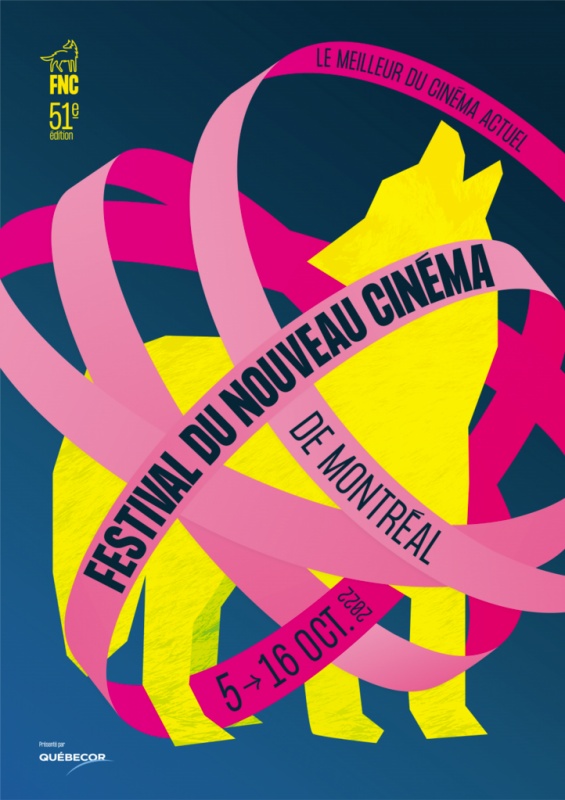
FNC 2022: the Best of the Selection
Fresh out of the Venice Film Festival with the Grand Jury Prize in hands, Pedro Harres’s FROM THE MAIN SQUARE (our interview) was undoubtedly the most anticipated project of the selection. This animated short film presents a conflict between different factions of an ever-developing city. The story begins peacefully with the first peoples of the territory sitting around a fire, but the whole thing quickly turns into chaos as unbridled industrialization and polarization between opposing parties in the metropolis lead to a bloody conclusion.
The simple appearance of the sketches and the absence of dialogue belie a disturbing and unfortunately topical story, especially in context of the director’s native Brazil. The success of FROM THE MAIN SQUARE is all the more impressive when you consider it is Pablo Harres’ thesis film. The director made it while studying at the prestigious Filmuniversität Babelsberg Konrad Wolf (which had given us the excellent ROOMS, by Christian Zipfel, presented at the FNC in 2018).
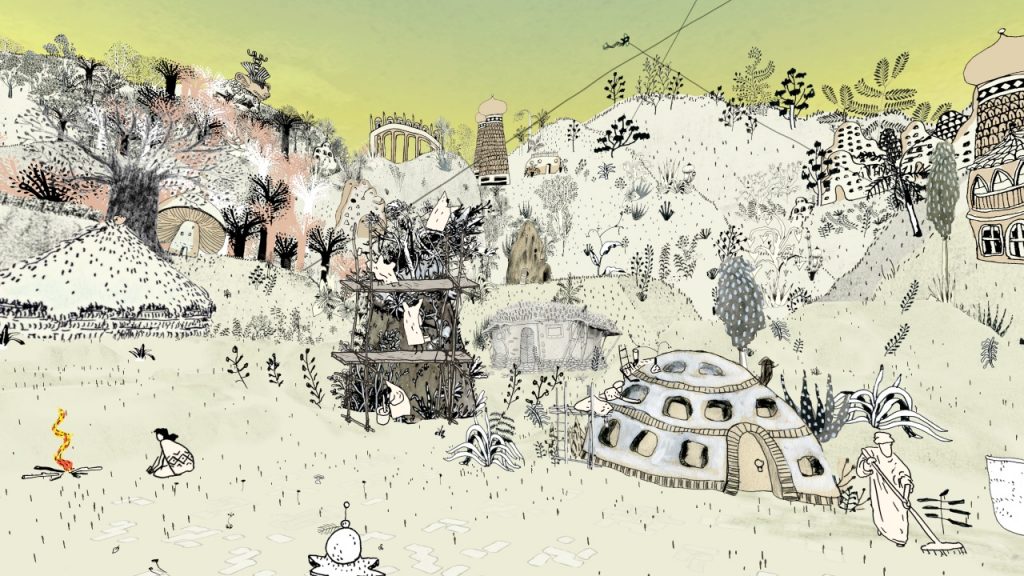
The award-winning documentary ON THE MORNING YOU WAKE (TO THE END OF THE WORLD – our interviews), co-produced by Archer’s Mark and Atlas V, recounts the events of January 13, 2018, when everyone in Hawaiʻi received a ballistic missile alert, which turned out to be a mistake. The project is part of an impact campaign that aims to raise awareness for the still very current reality of nuclear threats. Produced by the same teams that gave us NOTES ON BLINDNESS (presented at the FNC in 2016), ON THE MORNING YOU WAKE continues to show how virtual reality can be used to document reality and to translate experiences that are out of the ordinary.
Finally, I was happy to see PLASTISAPIENS making the rounds, having already made its mark during its premiere at the Tribeca film festival last June. Directed by Miri Chekhanovich and Edith Jorisch, PLASTISAPIENS offers a surreal exploration of a future where the human race has evolved in response to overexposure to microplastics. The project is both meditative and playful, inviting us to embody new non-human bodies and explore the limits of our humanity.
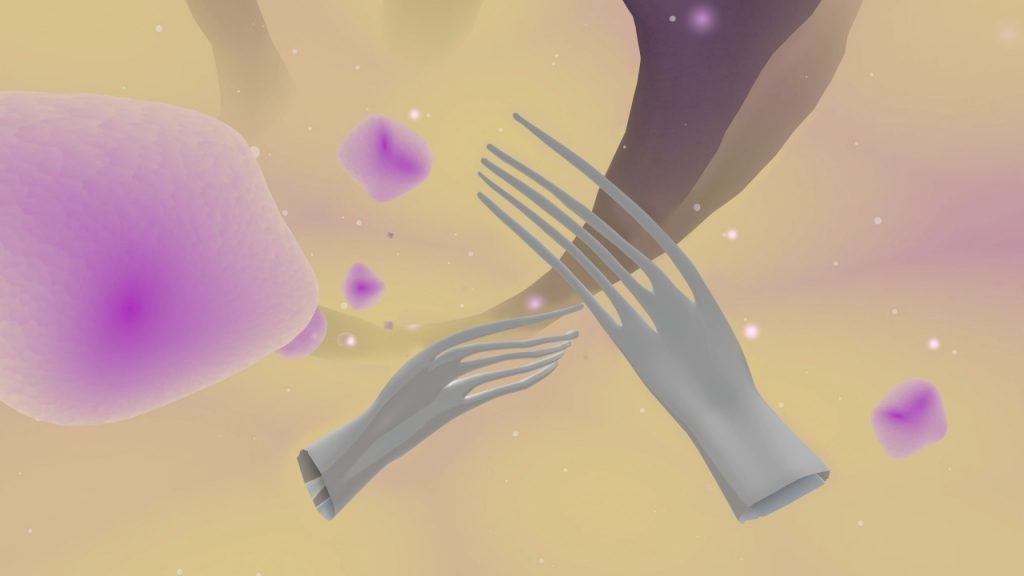
FNC 2022: Panorama 360
Considering that half of the FNC Explore 2022 programme consists of 360 VR works, it should come as no surprise that some of the best experiences in the selection were presented in this format. These include THIS IS NOT A CEREMONY, a first virtual reality documentary by Ahnahksipiitaa (Colin Van Loon). First shown at the Sundance Festival in January, the 360 video features two men who, through their testimonies, offer a glimpse at the violence enacted upon indigenous men by colonial powers in Canada. While the film starts with two trickster poets exchanging quips and dark humour, the story wastes no time pointing its finger at the atrocities of which the spectator is complicit. Importantly, THIS IS NOT A CEREMONY asks the view to become the “human ledge” of the stories they have been told, so as to ensure that these crimes do not fall under silence. Produced by the National Film Board of Canada’s interactive studios, the work is currently circulating across the country.
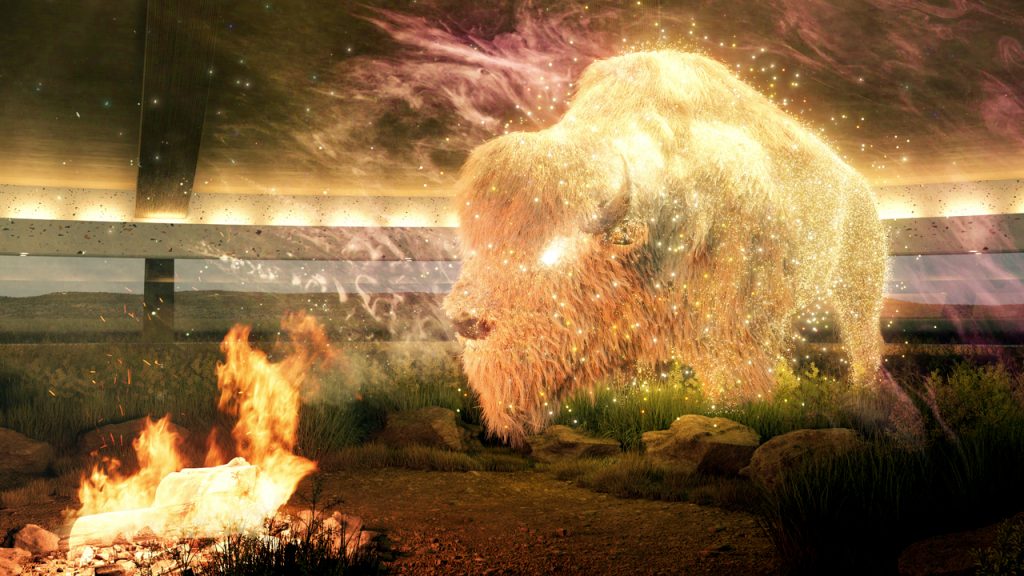
MONTEGELATO (Davide Rapp, 2021) is based on a deceptively simple concept that is wonderfully executed. The project features clips taken of 180 films, TV series and commercials that were shot in front of the famous Montegelato Falls, near Rome. These sequences are arranged across a 360° sphere, superimposing one after the other the different representations of the same landscape. Echoing the work of the Forensic Architecture laboratory, the film proposes a reconstruction of a complete space using scattered fragments. What’s more, MONTEGELATO allows its viewers to explore the space in an extremely logical way, making it a perfect example of what 360° video can accomplish.
GENESIS (Jörg Courtial, 2021) and 21-22 CHINA (Thierry Loa, 2022) are two 360° projects that work perfectly as a pair. In fact, I strongly suggest seeing them one after the other, in that order. The first tells the story of the earth from its inception to the present day and highlights how humans are an infinitesimally small part of our planet’s existence. Despite our laughably short time on this earth, humankind’s impact has been monumental.
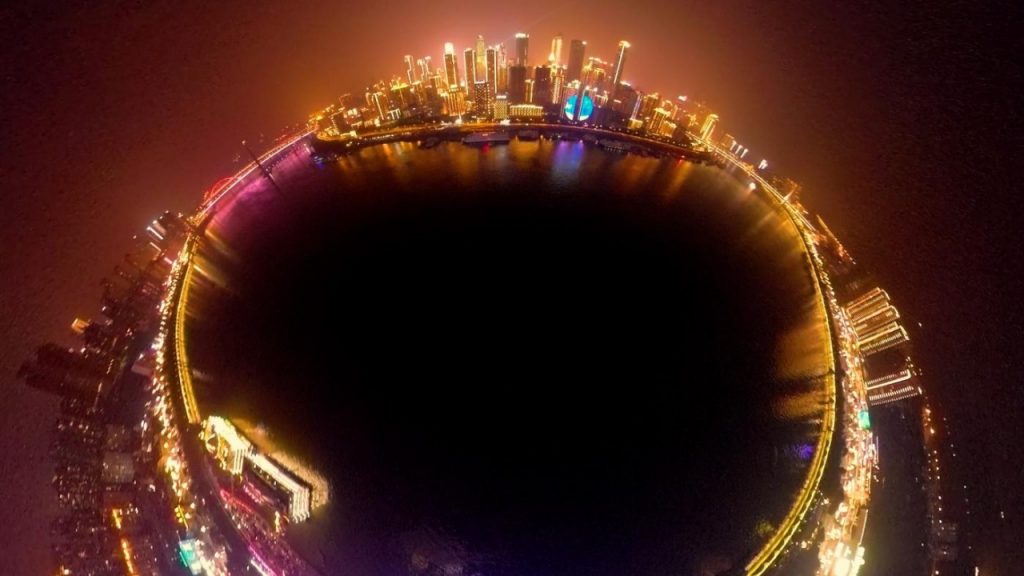
21-22 CHINA offers a sober look at this irreversible impact. As we had already seen in 2019 with 21-22 ALPHA, Thierry Loa’s pilot project, the film offers 360° views taken by a drone flying over landscapes; first natural, then completely transformed by civilization. While the images of Chinese cities illuminated at night are breathtaking, the juxtaposition of images of untouched natural landmarks and images of dense urban centres and towering skyscrapers are a sobering reminder of the extreme—and destructive—impact we have on our habitat.
While some people are reluctant to categorize 360° works as virtual reality, these four projects demonstrate how the medium, when used wisely, can allow the audience to be transported to places they would never have been able to see with their own eyes. It is not necessary to have six degrees of freedom or to have agency for a work to be considered Immersive.
To interact, or not – This is the Question
The 13 projects in the FNC Explore selection are divided into two sections: Panorama VR 360 and Horizon VR. 360° projects are thus presented separately from 6DoF works, which generally differ through their use of different modes of interaction. However, just because a project affords their user a modicum of agency does not mean that it is intrinsically better than a non-interactive work. Several experiences presented in the FNC 2022 selection demonstrate this (unfortunately) well. For example, the highly anticipated FIGHT BACK by Céline Tricart offers some interactive sequences which, in my experience at least, felt clumsy and only came up very briefly after comparatively long bits of narration. This undermines overall quality of the experience by putting the technical weaknesses of the Quest 2 system at the forefront, at the expense of the narrative. Unlike THE KEY (Céline Tricart, 2019), here embodiment and agency are a disservice to the project’s true narrative conclusion.
The moments of interaction proposed by BLOOD RELATIONS (Analee Weinberger, 2022) also hampered the narrative they punctuated. Presented as a quest through the director’s own family lineage, the project kept reminding me that I could choose to interact with certain objects to discover new parts of the story. However, it was impossible not to interact. The question I am left with is, if I have no other option but to interact, was I ever really given a choice?
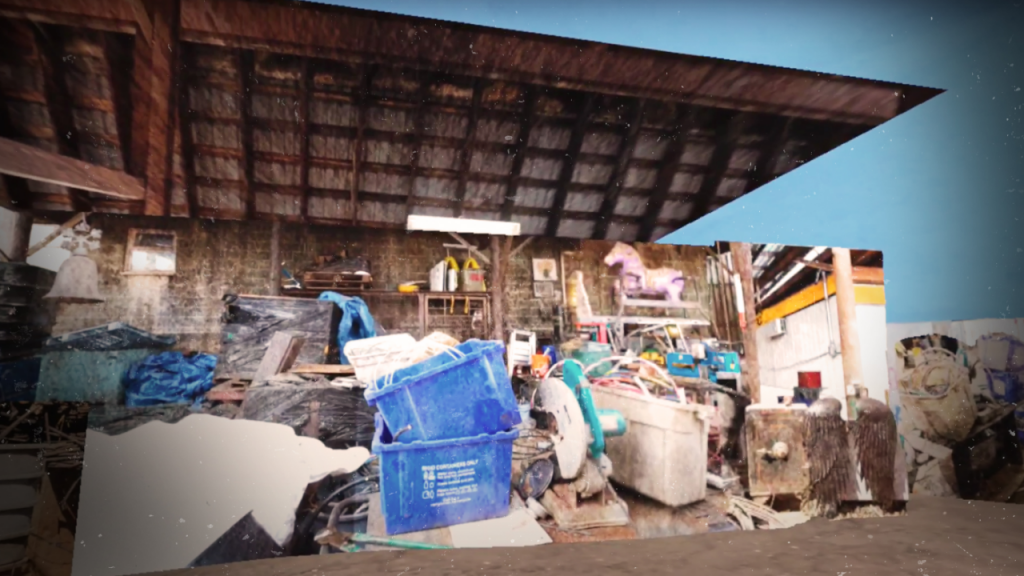
Meanwhile, DIAGNOSIA (Mengtai Zhang, 2022) allowed me to manipulate objects that triggered a narrative that I would not have heard otherwise. The 6DoF experience puts viewers in the director’s shoes as he is placed in a rehabilitation centre for Internet addiction, a diagnosis imposed on several young adults in China since the early 2000s. In addition to the elements of the story that are narrated by the director or that the other characters reveal to us, the option to pick up and listen to entries in the character’s diary allowed me to add depth to an otherwise self-contained story.
The issue with novelty
Having seen all the works of the FNC 2022 selection, I’m still surprised by the discoveries that the Festival du Nouveau Cinéma allows me to make every year. That said, I can’t help but notice I keep making fewer discoveries with every passing year. Where are the successors to MACHINE TO BE ANOTHER (BeAnotherLab, 2014) and THE DOGHOUSE (Mads Damsbo and Johan Knattrup Jensen, 2014 – our interview with Makropol), two fascinating projects which were my introduction to VR at FNC all these years ago?
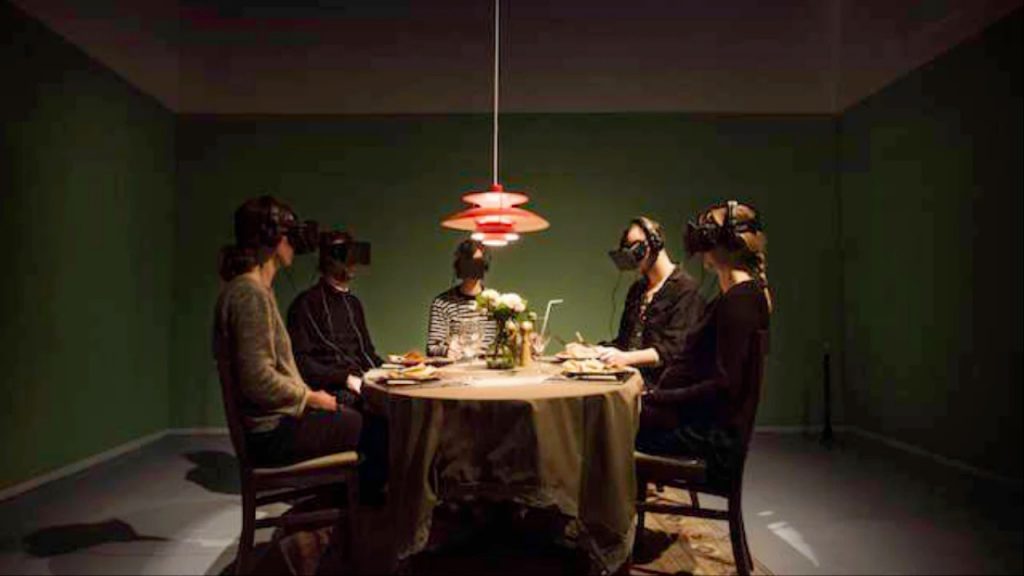
According to Katayoun Dibamehr, head of programming for FNC Explore, virtual reality has reached a stage where technology can finally take a back seat and let the artists and their stories speak for themselves. We can see this very well in a project like FROM THE MAIN SQUARE, where the artist’s message is allowed to shine, and where the use of virtual reality is not an end in itself; technology is forgotten to let narrative speak for itself.
What FROM THE MAIN SQUARE also shows me is that there still exist projects that manage to amaze me, even after all these years, and even with relatively simple means. This project gives me hope that we are still far from having discovered all that was possible to accomplish with virtual reality.

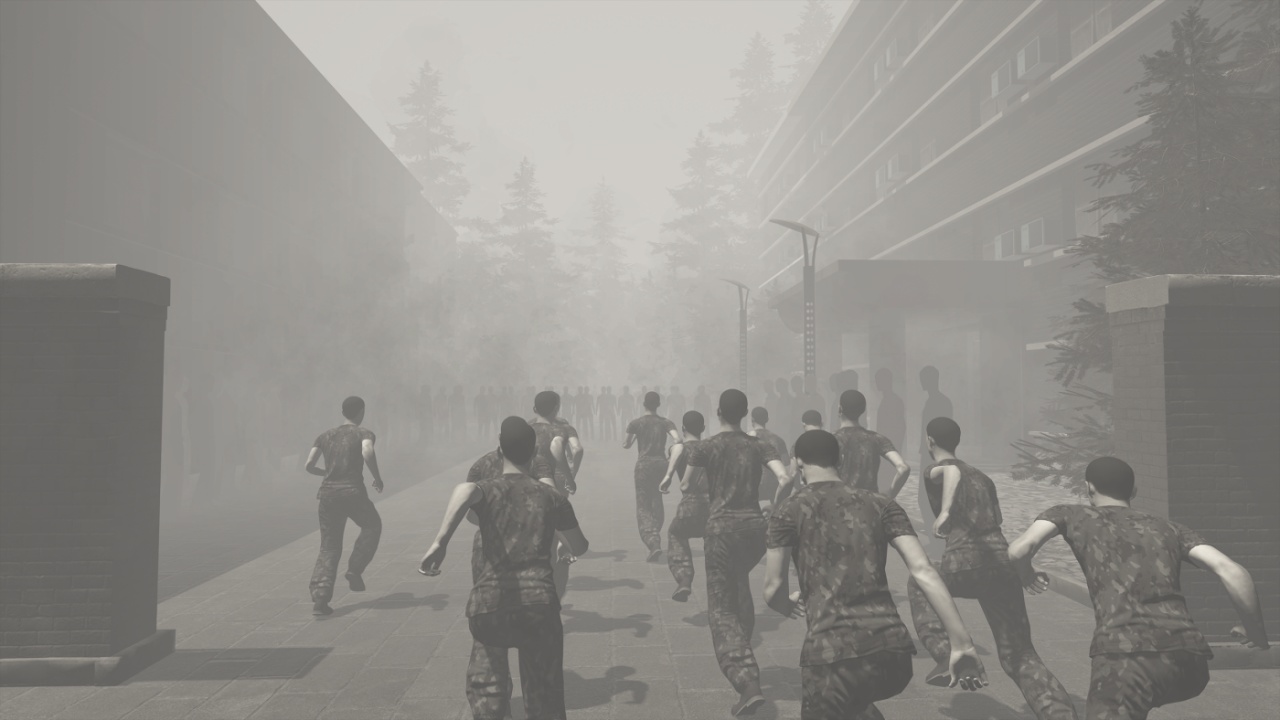

Leave a Reply
You must be logged in to post a comment.